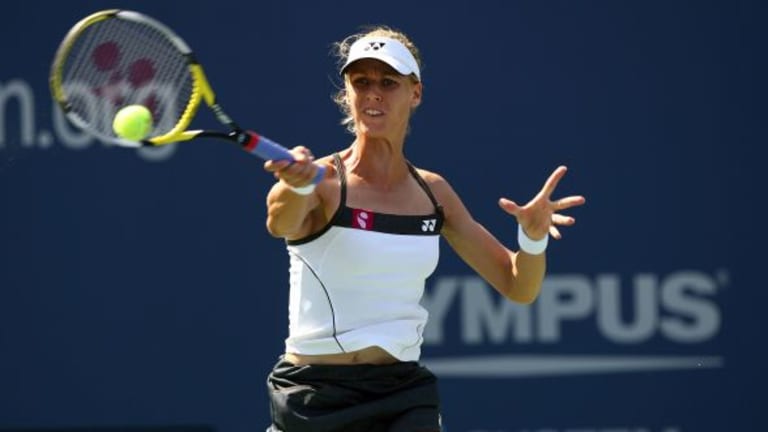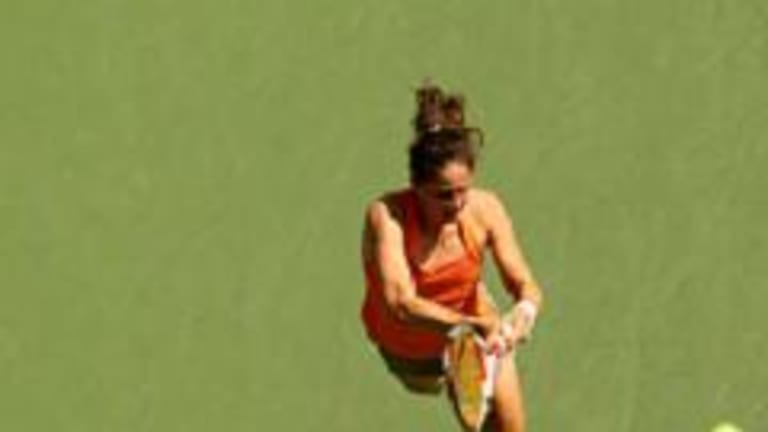In purely technical terms, though, Schnyder is a marvel. She routinely hits shots that color-by-numbers stylists (think Maria Sharapova, or even Ana Ivanovic) probably aren't capable of even conceiving. Today, she won a few points with an acutely angled topspin forehand hit from the mid-court, sweeping the ball up with an exaggerated low-to-high stroke (demanded by the need to clear the net from so close to it) - the tennis equivalent of a bending free kick in soccer. This girl can hit golf shots, using a surprisingly sharp wrist snap, and her drop-volley is superb. Like many lefthanders, Schnyder's forehand - which she hits with a nearly fully stretched arm that allows her to really roundhouse it - can sometimes misfire. But shot-wise, this girl has it all.
In fact, watching these two slug it out caused me to have an epiphany of sorts. There are two distinct branches in the women's game: the "girly" game (think Chris Evert, Monica Seles, Venus Williams, Jelena Jankovic, Dementieva), and something we'll just have to call, for lack of a better term, the "manly" game (think Martina Navratilova, Justine Henin, Steffi Graf, Serena Williams, Schnyder).There's no snide gender prejudice in this - it's just that some women conform to the image of a conservative, reined-in, no-frills game (the girly game) more than others. Dementieva plays this girly game at an extremely high level because of her exceptional athleticism.
I suppose you could flip the genders around and say that Rafael Nadal or Nikolay Davydenko play a girly game, but the distinction between the girly and manly games loses its bite when you have guns like Nadal or wheels like Davydenko. The problem for women disposed to the manly game - meaning women who have an instinctive feeling for things like the topspin one-handed backhand, the big sliced serve, or the net game - is that the more power you have, the easier it is to win with the manly game. But gosh, don't you love to see a player like Serena Williams trying to channel her Inner Lew Hoad?
So where were we? Dementieva held her next service game to take the set, and celebrated the accomplishment with a bathroom break. Schnyder waited for her patiently, sitting in her chair like a regal personage with ballboys hovering all about, one of them shielding her from the sun with a giant umbrella. When play resumed, Schnyder held serve with ease and so did Dementieva, punctuating her service game with an ace. In the next game, though, Schnyder got herself into the familiar territory of trouble, thanks mainly to Dementieva borrowing a page from the manly tennis playbook. At 40-30, she ended a brief rally with a sharp backhand slice approach shot, rolled in to the net, and ended the point with a drop volley. Sorry, but this is not the Elena Dementieva we know and love.
That ploy paid off, although it ultimately took her three deuces to get the job done. The final point was a wild forehand that Schnyder drove way deep, in what could easily be taken for a fickle loss of interest in continuing to resist. With the break in hand, Dementieva faltered. A double-fault (remember them?) put her down break-point, but she served her way out of trouble (feel free to re-read the last part of that sentence) by winning three straight points set up with excellent first serves - the last of them a 100 MPH-plus bomb to the backhand that almost knocked the stick out of Schnyder's hand.
Schnyder managed to break back for 3-3, which so displeased Dementieva that she decided she immediately needed to change rackets. It was not a changeover game, but she marched to her chair, drew a new, freshly-strung frame out of a plastic bag, carefully stuffed the empty bag into a free side pocket (you get the feeling that she's the type who actually vacuums under the sofa), and paused for a sip of water before returning to receive. What would she do next, get medivaced out by chopper so she could get a pedicure?
The little stall paid off (Schnyder is nothing if not easy), for in the next game - one filled with delightful shotmaking from both women - she broke Schnyder again. It's maddening, how unable Schnyder is to capitalize on an opportunity, or even to play better when she's ahead than behind. In the matches I've watched, she's always left me feeling that there's no deficit so big she can't overcome it - nor any lead so commanding that she can't blow it. I'd counsel her to consult a sports psychologist, but I'm afraid the poor therapist would fling himself off a bridge in frustration.
Once Dementieva nailed that break, it was over. A hold and a break put Dementieva into the semifinals, where she'll probably meet Jankovic in what ought to be an entertaining combat. I think Dementieva has a good shot - if she attacks Jankovic's serve. Although such bold, aggressive tactics are not ingrained in the girly game playbook, Dementieva's recent success - capped by her gold-medal effort in Beijing - owes a lot to her willingness to play more forcefully. Her meltdown against Dinara Safina at Roland Garros (Dementieva won the first set, lost the second in a tiebreaker, and then failed to win a game in the third set) helped her see the wisdom of that strategy:
"Well, after that match, you know, it took me a couple of days. I didn't want to practice, I didn't want to want to think about things. I didn't want to watch the final. It's really tough to have lost in the way I lost it. But it was an experience, you know. I started from all over again on grass - and lost again to Dinara.
But I was, you know, learning every time, and I think because of this experience I was able to win in Beijing."
She worked hard in the weeks that followed, with the ambition of doing well on the hard-court circuit best suited to her game. "I really wanted to attack more. I really wanted to, you know, be very aggressive on the court. You can't play defensive all the time if you want to be No. 1, if you want to win something big. I mean, that's the way to reply."
Aggression is the girly game's equivalent of the Rubicon; if you can get across it safely, you may never be the same player again. From her vantage point on the far side, Dementieva can wave back at Schnyder, who may not figure out how to make the best use of her talent until it's too late. In all fairness, she doesn't have the explosive quality that is one of the trademarks of Dementieva's game, nor the legs. Although most of us (meaning men) tend to be drawn to the parts of Dementieva that are above and between her shoulders and below her knees, the secret to her success lies in the middle of her anatomy - those powerful quads, and the stomach muscles that enable her to get so much torque into her shots.
I asked Schnyder, in the small interview room, if she felt she could ever learn to assert herself with greater authority when she was in a position to take control of a match. But she wasn't biting on the Psychology Today angle. Her explanation:
"For me, it's very tough to get my game together against the top players - they are so strong. If she (Dementieva) plays that well, I just have to accept it. I don't really know how to improve my game enough to play at that level."
Her reply was strikingly honest, and perhaps ultimately a comment on a reality that can't be all that pleasant to face. Sometimes, it's tough to be a girl with a manly game.

